Early Treats
15 May
After last weekend's trip to London, the pre-birthday treats have continued.
 Thursday evening took us off to the Plaza cinema for Kingdom of Heaven, Ridley
Scott's latest battle epic. Whilst it was not as good as
Gladiator, it was somewhat better than either
Troy or
Alexander. I still can't be moved to give it more than
two stars, however.
Thursday evening took us off to the Plaza cinema for Kingdom of Heaven, Ridley
Scott's latest battle epic. Whilst it was not as good as
Gladiator, it was somewhat better than either
Troy or
Alexander. I still can't be moved to give it more than
two stars, however. ![[Two Stars - Average]](2.gif)
I did worry about the idea of Orlando Bloom as the lead character. He's no Russell
Crowe. But Ridley Scott said that, after working with him on
Black Hawk Down, he felt he could do the
job. I'd say that the film was carefully scripted around Mr Bloom's lack of macho
charisma. I don't think I'd follow him into battle. Bed, yes. Battle, no. But then,
I'm of the Make Love Not War generation.

Mind you. Let's be clear about this. We don't go and see films like this for the plot
or the acting. We go to sand and sandals films for naked male flesh. In Troy,
it was Brad Pitt's bum and Orly's chest. In
Alexander it was Colin Farrel's nob and
Jared Leto's chest. Kingdom of Heaven was disappointing
in this respect also.
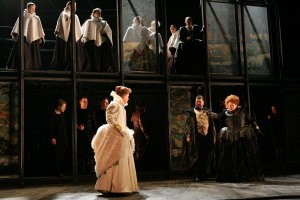 Friday evening, I journeyed over to Buxton with
Colin to see English Touring Opera's production
of Mary Stuart by Donizetti. The last time I saw this work was in a very
underwhelming performance and lacklustre production by English National Opera back
in 1998.
Friday evening, I journeyed over to Buxton with
Colin to see English Touring Opera's production
of Mary Stuart by Donizetti. The last time I saw this work was in a very
underwhelming performance and lacklustre production by English National Opera back
in 1998.
 Whilst never achieving the heights of dramatic bel canto, it was a stalwart rather
than a thrilling evening in the theatre. The production, constrained by the exigencies
of touring, was minimal but misjudged.
Whilst never achieving the heights of dramatic bel canto, it was a stalwart rather
than a thrilling evening in the theatre. The production, constrained by the exigencies
of touring, was minimal but misjudged.
 The two tier metal structure seemed to cause more problems than it solved, added little
to the stage pictures and was distracting in its use of sliding panels. Frankly, the
money might have been better spent on better costumes for the two principle ladies.
The two tier metal structure seemed to cause more problems than it solved, added little
to the stage pictures and was distracting in its use of sliding panels. Frankly, the
money might have been better spent on better costumes for the two principle ladies.
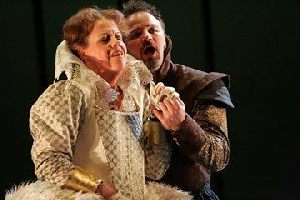
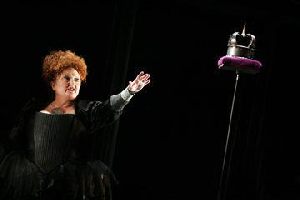
Anne Mason sang the title rôle with some aplomb and much jaw manipulation.
Sarah Rhodes gave of her utty as Elizabeth but seemed very out of sorts to be on stage.
They were not best supported by Noel Davies in the pit who conducted a very muddy
account of the score. Best singing came from the men. I liked Nicholas Ransley's clearly
focussed tenor voice as Leicester; best of all was Charles Johnston's resonant
baritone as Talbot. All in all, a good three stars.
![[Three Stars - Good]](3.gif)
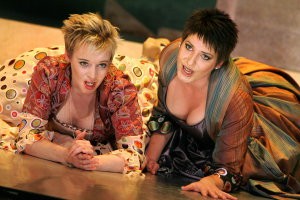 I was there again at the theatre on Saturday night, this time with
Ross. We stopped off for a lovely meal at the
Bells of Peover on the way there and were well prepared for ETO's second offering,
Cosi fan tutte by Mozart. It's over ten years since I last attended a performance
of this work. It's not been my favourite Mozart; pretty tunes but I just didn't get it.
I was there again at the theatre on Saturday night, this time with
Ross. We stopped off for a lovely meal at the
Bells of Peover on the way there and were well prepared for ETO's second offering,
Cosi fan tutte by Mozart. It's over ten years since I last attended a performance
of this work. It's not been my favourite Mozart; pretty tunes but I just didn't get it.
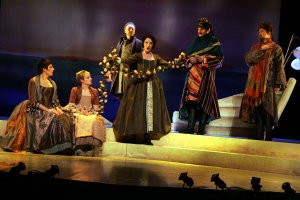 That all changed on Saturday. I suddenly understood the sheer emotional pain involved
in this piece about deception and personal discovery. This is what the best of ETO's work
is about; a direct and unforced presentation of the core of operatic masterpieces.
That all changed on Saturday. I suddenly understood the sheer emotional pain involved
in this piece about deception and personal discovery. This is what the best of ETO's work
is about; a direct and unforced presentation of the core of operatic masterpieces.
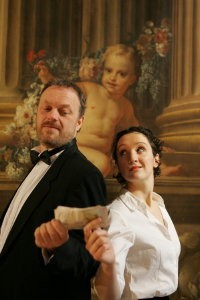 The first half was scintillating and frothy drawing enthusiastic applause from the
audience. The second half became progressively more painful and the applause at the end,
whilst generous, was more muted signifying that the audience had been gently unnerved.
The first half was scintillating and frothy drawing enthusiastic applause from the
audience. The second half became progressively more painful and the applause at the end,
whilst generous, was more muted signifying that the audience had been gently unnerved.
The problem with the piece, in general, is what to do with the end. Timothy Walker's
direction took its cue from the text and the music.
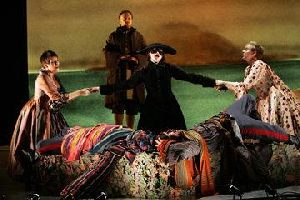 Leslie John Flanagan's nicely sung Guglielmo muttered his way though the final sextet
wishing that the wine they were drinking was poisoned; he couldn't bring himself to
re-unite with Fiordiligi. She, meanwhile, was totally bereft. Amanda Echalaz gave us a
virtuoso Come scoglio setting out the character's high ideals. Her fall from
grace, when it came, was all the more heart-rending and her lover's rejection all the
more devastating.
Leslie John Flanagan's nicely sung Guglielmo muttered his way though the final sextet
wishing that the wine they were drinking was poisoned; he couldn't bring himself to
re-unite with Fiordiligi. She, meanwhile, was totally bereft. Amanda Echalaz gave us a
virtuoso Come scoglio setting out the character's high ideals. Her fall from
grace, when it came, was all the more heart-rending and her lover's rejection all the
more devastating.
The other couple were more accommodating of each other. Rachel Nicholls gave us a
flighty, bubbly Dorabella. Her beau, Ferrando, played by Gardar Thór Cortes, was
honeyed in Un'aura amorosa, though he tired as the evening progressed. They were
happy to forgive and forget, though goodness only knows what the future held for them
with all trust gone.
Amy Freston's Despina was a pert, child of nature, happy to entertain Don Alfonso's
suggestions without ever understanding what he was up to - until the end. Her
desolation at the end was complete; her fun was annihilated by the cynicism of the
older man's machinations. And Andrew Slater's Don Alfonso achieved his aim. But there
was no pleasure or triumph in his achievement. Everyone had behaved as badly as he had
known they would.
Why was it special? I know that the cast at Covent Garden a decade ago sang the music
with much greater beauty and unforced projection. But. And this is a controversial but.
Singing the text in Italian may suit the lie of the music but, with a text as complex
as this, Italian forms a barrier to understanding and empathising. Similarly at ENO
a decade ago, English was a key to enjoyment but, in the barn that is the Coliseum, much
of the subtlety went for nothing. Buxton Opera House is exactly the right size of venue
for a work as intimate as this. And with a small orchestra, conducted with pungent brio
by Robert Dean, the words and music came across in spades.
Overall, I was transported; I was engaged; I was entertained; I was moved; I was given
pause for thought. Excellent, quite excellent.
![[Four Stars - Excellent]](4.gif)
 I've completed a couple more books. Line of Beauty by Alan Hollinghurst was a
good read - pleasurably satirical about the moneyed classes during the mid-Thatcher
period. However, I couldn't really like it because the characters were mostly so
awful, especially the ligger of a narrator, Nick Guest. I mean just how long did he
think he could keep sponging off the upper classes before they would bite him in the
bum. In fact, the novels ends just as the story is getting interesting. How will
Nick survive once he has to actually earn a living. Still, I raced through it in a
matter of days.
I've completed a couple more books. Line of Beauty by Alan Hollinghurst was a
good read - pleasurably satirical about the moneyed classes during the mid-Thatcher
period. However, I couldn't really like it because the characters were mostly so
awful, especially the ligger of a narrator, Nick Guest. I mean just how long did he
think he could keep sponging off the upper classes before they would bite him in the
bum. In fact, the novels ends just as the story is getting interesting. How will
Nick survive once he has to actually earn a living. Still, I raced through it in a
matter of days.
![[Three Stars - Good]](3.gif)
 More weighty, in all sorts of ways, was Colossus by Niall Ferguson, who was also
responsible for Empire. This tome investigates the
American empire and is very good on the internal contradictions of American foreign
policy - yes, we will invade you but we won't say very long and whoops we're now
embroiled in guerrilla warfare with an enemy we don't know anything about and public
opinion is turning against us in an election year so we'd better get out of here as
quickly as we can and damn the chaos we leave behind. That was the story of an
intervention in the Philippines in 1901, by the way. But you can see Korea, Vietnam
and Iraq there as well.
More weighty, in all sorts of ways, was Colossus by Niall Ferguson, who was also
responsible for Empire. This tome investigates the
American empire and is very good on the internal contradictions of American foreign
policy - yes, we will invade you but we won't say very long and whoops we're now
embroiled in guerrilla warfare with an enemy we don't know anything about and public
opinion is turning against us in an election year so we'd better get out of here as
quickly as we can and damn the chaos we leave behind. That was the story of an
intervention in the Philippines in 1901, by the way. But you can see Korea, Vietnam
and Iraq there as well.
What I'm less happy about in the final analysis is Ferguson's conclusions that the
world needs the USA to be more and not less of an Empire builder. He believes that
they should invade countries and that they should then occupy for a long period of
time to bring stability to a region. But what he really seems to be wanting is for
classic Western monetarist economies and the circumstances for them to thrive to be
imposed on all countries of the world whether they are a viable solution for a region
or not. So, although I found the book informative, I disliked the final assessments
so much that I'm only going to give it two stars.
![[Two Stars - Average]](2.gif)
 Thursday evening took us off to the Plaza cinema for Kingdom of Heaven, Ridley
Scott's latest battle epic. Whilst it was not as good as
Gladiator, it was somewhat better than either
Troy or
Alexander. I still can't be moved to give it more than
two stars, however.
Thursday evening took us off to the Plaza cinema for Kingdom of Heaven, Ridley
Scott's latest battle epic. Whilst it was not as good as
Gladiator, it was somewhat better than either
Troy or
Alexander. I still can't be moved to give it more than
two stars, however.  Friday evening, I journeyed over to Buxton with
Friday evening, I journeyed over to Buxton with
 Whilst never achieving the heights of dramatic bel canto, it was a stalwart rather
than a thrilling evening in the theatre. The production, constrained by the exigencies
of touring, was minimal but misjudged.
Whilst never achieving the heights of dramatic bel canto, it was a stalwart rather
than a thrilling evening in the theatre. The production, constrained by the exigencies
of touring, was minimal but misjudged.
 The two tier metal structure seemed to cause more problems than it solved, added little
to the stage pictures and was distracting in its use of sliding panels. Frankly, the
money might have been better spent on better costumes for the two principle ladies.
The two tier metal structure seemed to cause more problems than it solved, added little
to the stage pictures and was distracting in its use of sliding panels. Frankly, the
money might have been better spent on better costumes for the two principle ladies.


 I was there again at the theatre on Saturday night, this time with
I was there again at the theatre on Saturday night, this time with
 That all changed on Saturday. I suddenly understood the sheer emotional pain involved
in this piece about deception and personal discovery. This is what the best of ETO's work
is about; a direct and unforced presentation of the core of operatic masterpieces.
That all changed on Saturday. I suddenly understood the sheer emotional pain involved
in this piece about deception and personal discovery. This is what the best of ETO's work
is about; a direct and unforced presentation of the core of operatic masterpieces.
 The first half was scintillating and frothy drawing enthusiastic applause from the
audience. The second half became progressively more painful and the applause at the end,
whilst generous, was more muted signifying that the audience had been gently unnerved.
The first half was scintillating and frothy drawing enthusiastic applause from the
audience. The second half became progressively more painful and the applause at the end,
whilst generous, was more muted signifying that the audience had been gently unnerved.
 Leslie John Flanagan's nicely sung Guglielmo muttered his way though the final sextet
wishing that the wine they were drinking was poisoned; he couldn't bring himself to
re-unite with Fiordiligi. She, meanwhile, was totally bereft. Amanda Echalaz gave us a
virtuoso Come scoglio setting out the character's high ideals. Her fall from
grace, when it came, was all the more heart-rending and her lover's rejection all the
more devastating.
Leslie John Flanagan's nicely sung Guglielmo muttered his way though the final sextet
wishing that the wine they were drinking was poisoned; he couldn't bring himself to
re-unite with Fiordiligi. She, meanwhile, was totally bereft. Amanda Echalaz gave us a
virtuoso Come scoglio setting out the character's high ideals. Her fall from
grace, when it came, was all the more heart-rending and her lover's rejection all the
more devastating.
 I've completed a couple more books. Line of Beauty by Alan Hollinghurst was a
good read - pleasurably satirical about the moneyed classes during the mid-Thatcher
period. However, I couldn't really like it because the characters were mostly so
awful, especially the ligger of a narrator, Nick Guest. I mean just how long did he
think he could keep sponging off the upper classes before they would bite him in the
bum. In fact, the novels ends just as the story is getting interesting. How will
Nick survive once he has to actually earn a living. Still, I raced through it in a
matter of days.
I've completed a couple more books. Line of Beauty by Alan Hollinghurst was a
good read - pleasurably satirical about the moneyed classes during the mid-Thatcher
period. However, I couldn't really like it because the characters were mostly so
awful, especially the ligger of a narrator, Nick Guest. I mean just how long did he
think he could keep sponging off the upper classes before they would bite him in the
bum. In fact, the novels ends just as the story is getting interesting. How will
Nick survive once he has to actually earn a living. Still, I raced through it in a
matter of days.
 More weighty, in all sorts of ways, was Colossus by Niall Ferguson, who was also
responsible for
More weighty, in all sorts of ways, was Colossus by Niall Ferguson, who was also
responsible for